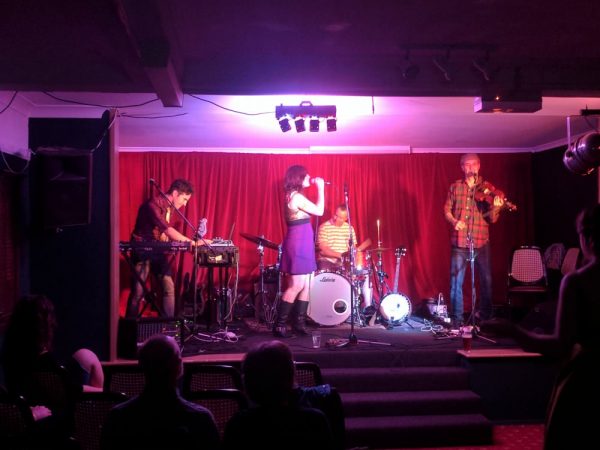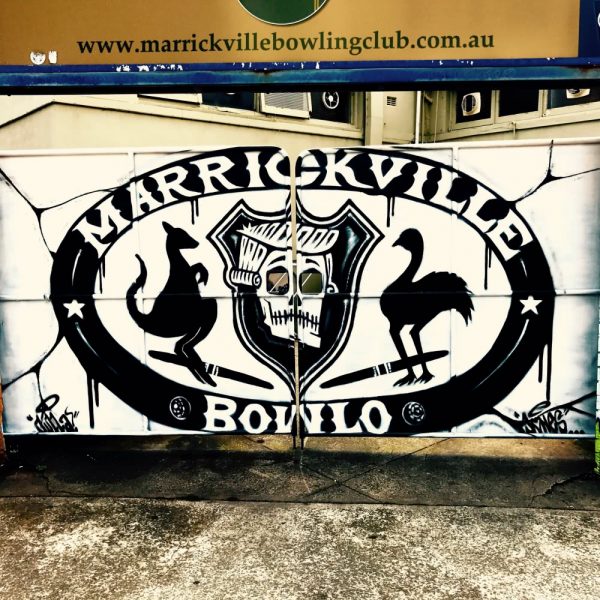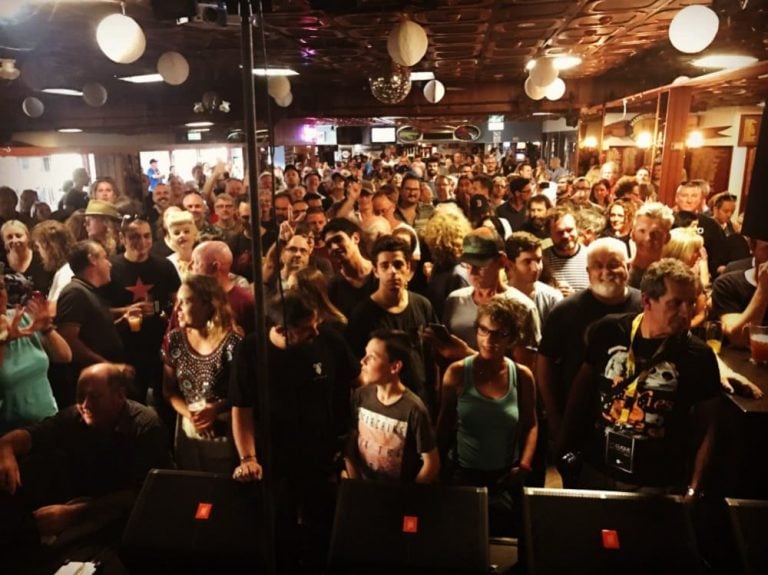In Sydney’s Inner West, lawn bowls and smooth sailing greens are quickly becoming integral to the ongoing prosperity of the local music scene.
Armed with wide-open spaces, social membership and a willingness to embrace creativity, community clubs such as the Petersham Bowling Club and the Marrickville Bowling and Recreation Club are taking it upon themselves to nurture and support live music – the benefits of which are paramount to their ongoing survival in a testing economic climate, while also providing greater social cohesion and growth within their local community.
For a music scene met by uncertainty in recent times, it’s these two-way relationships – built upon artistic value and appreciation – that are the source of thriving creativity and musical expression.
Petersham Bowling Club: from pokies to live music
“I suppose what I love most about the Petersham Bowling Club, it’s an intersection,” says Petersham Bowling Club (PBC) president George Catsi. “Because we’re so small, you have to bump into somebody else there, another type of person. And what the music brings, it brings certain people and certain crowds, and whilst they’re there they bump into kind of a kids’ party outside or there might be a wake in the corner, somebody planning a wedding, you know, they’re walking through and then there’s just a local person here. And we all sort of intermingle. And what happens is, culturally, we grow. And I don’t know how many people have discovered musicians just because they happen to be at the club.”
In the mid-2000s the PBC faced a period of substantial financial stress and instability that threatened to derail its operations. These failings culminated in significant development proposals in 2004 and 2006, both of which were vehemently challenged by the local community, and successfully voted down. It was at this point in time that Catsi stepped up to become club president, leading a new board populated by community members, encouraged by the potential to shape the PBC into a creative community hub.

‘There was barely any income. There was not debt because they’d sold a couple poker machine licenses, but we still had poker machines. There was no paid staff. It really was in a bad way. So that’s what we inherited in 2006.”
Love Music?
Get your daily dose of metal, rock, indie, pop, and everything else in between.
Yet Catsi was driven by an inherent belief that “good things could happen here”. The vision was to create a club environment that reflected upon and, in turn, fuelled community interests and expectations. A place where sport intertwined with music; where art fused with recreation; where families could bring their kids to enjoy live music, while having a cold beer. Six months into Catsi’s presidency the PBC decided to remove pokie machines from the premises.
“And then we became loud and proud of that and to the world said, ‘We’ve thrown our pokies out!’ We were one of the first to do that … and we, contrary to what Clubs NSW would have said, we had a lift in our trade … and suddenly people were going, ‘We want to go to a club that doesn’t have pokies, we want to support you in that.’”
The outcome of this was twofold: it gave the club a stronger assertion of its community values, and it created the space required for a versatile music program.
“A guy called Mark Lucas came in as a volunteer cause we were pokie-free,” Catsi explains. “He was a muso, and he said, ‘I want to play music here for free because I want to support what you do’… And then Mark came on the board, and then [he] started to build the music program into that space and then we eventually built a stage. And I stepped down for a while as president, because I had to get my life back. This was all voluntary for us. And then he became president, and that music program continued to push and he built that music program.”
That was six years ago.
Meanwhile, in Marrickville…
One suburb south of the PBC, a similar story can be heard at the Marrickville Bowling and Recreation Club (MBRC), where a community-based music program with a similar grassroots approach is flourishing. As the club’s general manager and band booker, Tommy Jones saw the unique opportunity the clubhouse offered as a music venue.
“I guess the lack of venues with a similar sort of size was a big sort of thing for me and in the area. And a lack of venues in Sydney in general … There were just so many benefits about it: good location, the size of it, what it has to offer, and just being a sort of community club as well.”
It was a little over two years ago the MBRC began staging music events, with the local council providing a grant to build a stage, and the club investing in a PA. It was a decision that, in spite of some members requiring a little convincing, has been paying dividends ever since.
“It does co-exist quite well,” says Jones. “A lot of the time when you get gigs on you don’t really have the bowlers there, like it’s a different day and night type thing … But I think there’s always going to be a bit of opposition in clubs, of the culture changing towards something like live music. But I think for the most part people are really happy to see that the club’s doing something and that also, you know, the further we get these days it’s clubs like ours that are barely surviving just as bowling clubs. So I think you have to really look at other options of how to get income for the business, and music has turned out to be one of those options for the Marrickville Bowlo.”

Without the budget of your traditional music venue the success of live music at the MBRC hinges upon the ability of the club and musicians and promoters to meet on middle ground. This means the club forgoing creative control to independent promoters and, in turn, promoters taking on greater organisational responsibilities. It’s these unique interactions that see younger people being proactive and becoming creatively involved and engaged – something that Jones values and encourages.
“It’s important because that’s what creates the whole industry really, from that sort of grassroots level. You really need places like that where it can give younger people the opportunity to actually do something and promote because that’s going to be the people that are really sort of, you know, the next generation of people that are going to be heavily involved in the music industry. And they need a sort of starting place, and places like the Marrickville Bowling Club’s a great starting base.”
With a strong community club environment, made up of a diverse range of local members and willing creatives, music events held at the MBRC feel like they have an attuned connectedness with the suburb.
“It is predominantly the local demographic that it’s targeted towards, and so it’s benefitting the local Inner West and Marrickville community,” says Jones. “And just trying to push that culture with the local community as much as we can. And keeping the venues and clubs and things that are sort of social places where people can be entertained, and not just pubs and bars and, you know, pokies basically.”
Fostering creative communities
In order to build socially rich, interconnected local communities, personal investment, social exchange and collective thinking all play an essential part. For the local music scene to thrive, these sentiments hold just as much weight, with the availability of open and supportive creative spaces forming the backbone of grassroots movements.
Which is why live music continues to consume the MBRC from Friday nights through Sundays, each and every weekend. And why when Catsi returned to the presidency of the PBC in 2015, he used grant money to turn the downstairs room into another performance space, doubling the venue’s capacity for creative endeavours. As he explains, it’s a people before profits, community-comes-first approach that is making a real difference to the clubs and local musicians.
“We also try to get diversity in there,” Catsi explains. “We also have other types of performance too. Sometimes we have these really weird eclectic bands and musical ensembles come through, quite interesting stuff. So we try and be a bit diverse where possible because it’s a community club. And it’s interesting because we’ve had some other music reviewers come through and say, ‘Hey, you can be getting more money out of this,’ and we’re going, ‘Oh yeah, we don’t want to.’ You know, ‘You should charge the bands for the PA and you know, some of the mix, and you take your cut off the door,’ which a lot of [venues] do. But we don’t do that.”
Whether it’s live music, playing bowls, or mixing with the locals, the key ingredient to the success of the MBRC and the PBC is an endeavour to do things their own way.
“It’s part of our identity politics if you like,” says Catsi. “We think it’s what makes the Inner West a great place and we’re a great part of that. I don’t want to say we’re the leaders, but you can see a lot of it now. When we started there were no real local craft breweries, and we were one of the first to start sourcing local, we get our local gins and we get all that … Mind you it is our competition now, so it is a bit harder for us to distinguish ourselves, but we think it all feeds into a really vibrant society and a vibrant community.”
Photos: Supplied

































